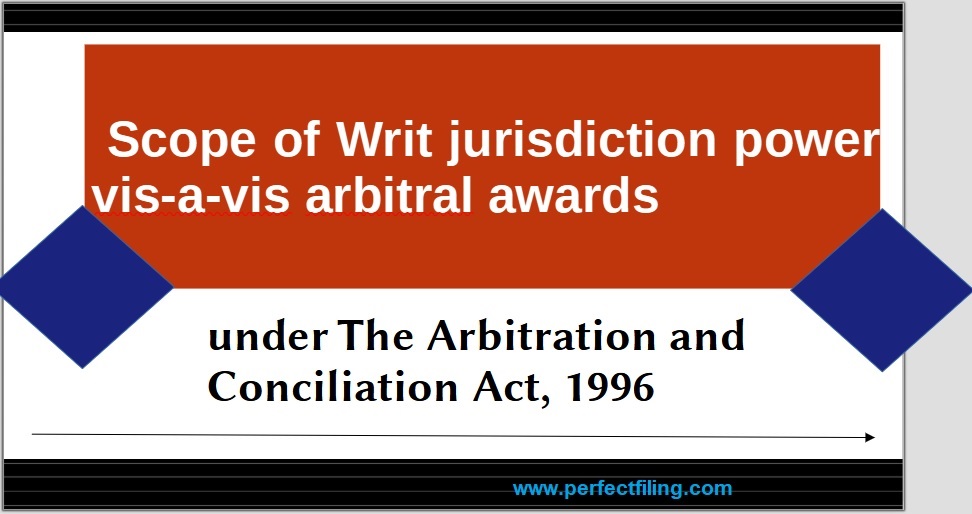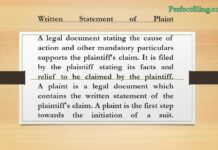
With the changing time, the adjudication process has evolved, becoming simpliciter providing alternative remedies in case of a dispute thereby reducing the cost and complexities of the primeval process. ‘Arbitration’ is necessarily one of them, which can be identified as a one of its kind flexible and consensual mechanism for resolving disputes (not necessarily commercial in nature) in a binding and enforceable manner, wherein parties refer their disputes to a neutral third party or a panel of neutral parties without resorting to the court action.
India has in place a modern, an efficient arbitration mechanism in the form of ‘The Arbitration and Conciliation Act, 1996’ wherein the scheme of the act is clearly outlined, laying down the scope, ambit and intent of the legislation. Arbitration is a private fora chosen voluntarily by the parties to the dispute, to adjudicate their disputes in place of courts and tribunals which are public fora constituted under the laws of the country; so necessarily not all disputes could be held arbitrable. The meaning of the expression ‘Arbitrable’ has been discussed time and again by judicial authorities, where it has been observed,
“Adjudication of certain categories of proceedings are reserved by the legislature exclusively for public fora as a matter of public policy. Certain other categories of cases, though not expressly reserved for adjudication by public fora (courts and tribunals), may by necessary implication stand excluded from the purview of private fora. Consequently, where the cause/dispute is inarbitrable, the court where a suit is pending, will refuse to refer the parties to arbitration, under Section 8 of the Act, even if the parties might have agreed upon arbitration as the forum for settlement of such disputes” and one such example is disputes relating to rights and liabilities which give rise to or arise out of criminal offences.
The Tribunal under the act, has been bestowed with enormous powers dealing with the adjudication of the disputes and the scope of judicial intervention during and post the process is limited to a great extent. Section 34 is one such provision where the rule with respect to the setting aside of an award is embodied. On 20th April 2020, Honorable High Court of Gujarat has pronounced a judgment in the case of ‘GTPL Hathway Ltd. vs Strategic Marketing Private Limited’, where the contentions on the proposition: whether any order passed during pendency of arbitration proceedings under the Act 1996 can be challenged by certiorari under Articles 226 and 227 of the Constitution of India or not? has been settled citing various key precedents and judicial interpretation of the existing law.
The brief facts of the case are that the petitioner filed a suit under Article 226 of the constitution, challenging the ongoing arbitral proceedings on the ground that dispute raised in the suit is not capable of settlement through arbitration. The preliminary objections were dismissed by the tribunal and as a result – present petition was filed praying that impugned order can be challenged under Article 226 and/or 227 of the Constitution of India because Arbitration Tribunal cannot be permitted to continue with arbitration proceedings when dispute is non arbitrable as there are serious allegations of fraud leveled by the petitioner which requires evidence for deciding the issue pertaining to criminal offences for which criminal proceedings are pending before the appropriate Court.
In light of the facts and issues raised herein, the scope of the judicial power of writs need to be discussed. Under Article 226 of the Constitution of India, the High Court, having regard to the facts of the case, has a discretion to entertain or not to entertain a writ petition. The power of the High Court to issue prerogative writs is wide. The Constitution does not place any limitation on such power. However, the Courts have, through judicial pronouncements, evolved self imposed restrictions on the exercise of power by the writ Court. When an efficacious alternative remedy is available, the High Court does not normally exercise jurisdiction. There are certain well recognised exceptions where the bar of alternative remedy does not apply. Where the authority has acted without jurisdiction, the High Court should not refuse to exercise its jurisdiction under Article 226 of the Constitution on the ground of an alternative remedy, as held in Kuntesh Gupta vs. Management of Hindu Kanya Mahavidyalaya, Sitapur, U.P. & Ors. Complete lack of jurisdiction of an authority to take the impugned action, as in this case, is always a good ground to entertain a writ petition. Moreover, as held by the Court in State of U.P and Others vs. Indian Hume Pipe Co. Ltd, there is no rule of law that the High Court should not entertain a writ petition when an alternative remedy is available to a party. It is always a matter of discretion with the Court and if the discretion has been exercised by the High Court not unreasonably or perversely, it is settled practice of this Court not to interfere with the exercise of discretion by the High Court.
Whether remedy under Article 226 can be invoked or not in cases of arbitration was firmly settled by the Apex Court in the case of S.B.P. & Co. v. Patel Engineering Ltd. where it has been held;
“…….Under Section 34, the aggrieved party has an avenue for ventilating his grievances against the award including any in between orders that might have been passed by the arbitral tribunal acting under Section 16 of the Act. The party aggrieved by any order of the arbitral tribunal, unless has a right of appeal under Section 37 of the Act, has to wait until the award is passed by the Tribunal. This appears to be the scheme of the Act. The arbitral tribunal is after all, the creature of a contract between the parties, the arbitration agreement, even though if the occasion arises, the Chief Justice may constitute it based on the contract between the parties. But that would not alter the status of the arbitral tribunal. It will still be a forum chosen by the parties by agreement. We, therefore, disapprove of the stand adopted by some of the High Courts that any order passed by the arbitral tribunal is capable of being corrected by the High Court under Article 226 or 227 of the Constitution of India. Such an intervention by the High Courts is not permissible.”
The Arbitration and Conciliation Act, 1996 is a self-explanatory code, where the scope of ‘judicial intervention’ has been cleared under certain sections.
Firstly, section 5 of the Act, 1996 provides that notwithstanding anything contained in any other law for the time being in force, in matters governed by this part, no judicial authority shall intervene except where so provided in this part.
Secondly, It incorporates the well known doctrine of “Kompetenz Kompetenz” or “competence de la competence” under section 16(1). It recognizes and enshrines an important principle that initially and primarily, it is for the Arbitral Tribunal itself to determine whether it has jurisdiction in the matter, subject of course, to ultimate court control. It is thus a rule of chronological priority. Kompetenz Kompetenz is a widely accepted feature of modern international arbitration, and allows the Arbitral Tribunal to decide its own jurisdiction including ruling on any objections with respect to the existence or validity of the arbitration agreement, subject to final review by a competent court of law; i.e. subject to Section 34 of the Act. The said rule also has been outlined and discussed by Hon’ble Justice C.K. Thakkar while concurring with the majority opinion in the case of S.B.P & Co. (supra).
Lastly, section 16 of the Act,1996 which provides for competence of Arbitration Tribunal to rule on its jurisdiction and subsection(6) of section 16 of the Act, 1996 which provides that a party aggrieved by such an arbitral award may make an application for setting aside such an arbitral award in accordance with section 34 of the Act, 1996. In view of such provisions, it was submitted that there is a remedy available to the petitioner under section 34 of the Act, 1996 for setting aside the arbitral award.
It is widely clear that the the Scheme of the Act reveals that once the arbitrator enters into reference, the challenge to his jurisdiction questioning his independence or impartiality or otherwise has to be made before the arbitrator himself. Even before the arbitrator such challenge cannot be made by the party to the proceeding belatedly at his whims and fancy. Moreover, if the challenge of the party to the arbitrator fails then the arbitrator will proceed with the arbitration proceedings and the party aggrieved has to wait till the passing of the award and there after, the validity of the award can be assailed by the aggrieved party only by invoking the provisions of Section 34 of the Act.
It is to be noted that while discussing the scope of judicial intervention under the Arbitration Act, one another contention which is widely raised is that, under Chapter VII of the act ‘arbitral award’ including an ‘interim award’ as defined in section 2(c) is held to be a ‘decree’ as passed by the court, so it can be challenged as in the case of a suit before a court. However, Delhi High Court in ATV Projects India Ltd. v. Indian Oil Corporation Ltd. & Anr. has held;
“the proceedings under the Arbitration Act cannot at all times be viewed through the prism of CPC. The Act equates the award to a ‘decree’ only for the purposes of the enforcement thereof under Section 36 and our concepts and terminology of a suit cannot otherwise be applied to arbitration proceedings. The legal fiction of equating the award to a decree is for the limited purpose of enforcement and not intended to make an award a decree for all purposes”.
At this conclusion stage, the recent pronouncement by the Apex Court in the case of M/s. Deep Industries Limited v. Oil and Natural Gas Corporation (order dated 28th November, 2019 in Civil Appeal No.9106/2019) is widely important, where it has been observed that;
“if petitions were to be filed under Articles 226/227 of the Constitution against orders passed in appeals under Section 37, the entire arbitral process would be derailed and would not come to fruition for many years. At the same time, we cannot forget that Article 227 is a constitutional provision which remains untouched by the non-obstante clause of Section 5 of the Act. In these circumstances, what is important to note is that though petitions can be filed under Article 227 against judgments allowing or dismissing first appeals under Section 37 of the Act, yet the High Court would be extremely circumspect in interfering with the same, taking into account the statutory policy as adumbrated by us herein above so that interference is restricted to orders that are passed which are patently lacking in inherent jurisdiction.”
The Apex Court judgment in Deep Industries Limited (supra) weighs in favour of the act being a “self-contained” act and limits the opportunity of approaching writ jurisdiction of court only in case of ‘patent lack in inherent jurisdiction’. While relying on the judgments in the cases of S.B.P & Co. (supra) and Deep Industries Limited (supra), the Hon’ble High Court of Gujarat has dismissed the present petition without entering into merits of the matter, only on the ground that the order passed during course of arbitration cannot be challenged under Articles 226 and/or 227 of the constitution of India and it would be open for both the sides to raise all the contentions on merits before the appropriate forum in appropriate proceeding at appropriate time in accordance with law.
References:
-
The Arbitration and Conciliation Act 1996, available at http://legislative.gov.in/sites/default/files/A1996-26.pdf
-
Booz Allen and Hamilton Inc. v. SBI Home Finance Limited and Others, (2011) 5 SCC 532
-
State of Rajasthan v. Lord Northbrook 2019 SCC Online SCC 1117
-
M/s. S.B.P. and Co. v. M/s. Patel Engineering Ltd. and Anr. (2005) 8 SCC 618
-
Rajasthan State Mines and Minerals Ltd. v. M/s. R.A.M. Earth Movers Pvt. Ltd. & Anr, 2010 SCC OnLine Raj 4560
-
ATV Projects India Ltd. v. Indian Oil Corporation Ltd. & Anr., 2013 SCC OnLine Del 1669
-
M/s. Deep Industries Limited v. Oil and Natural Gas Corporation, order dated 28th November, 2019 in Civil Appeal No.9106/2019









